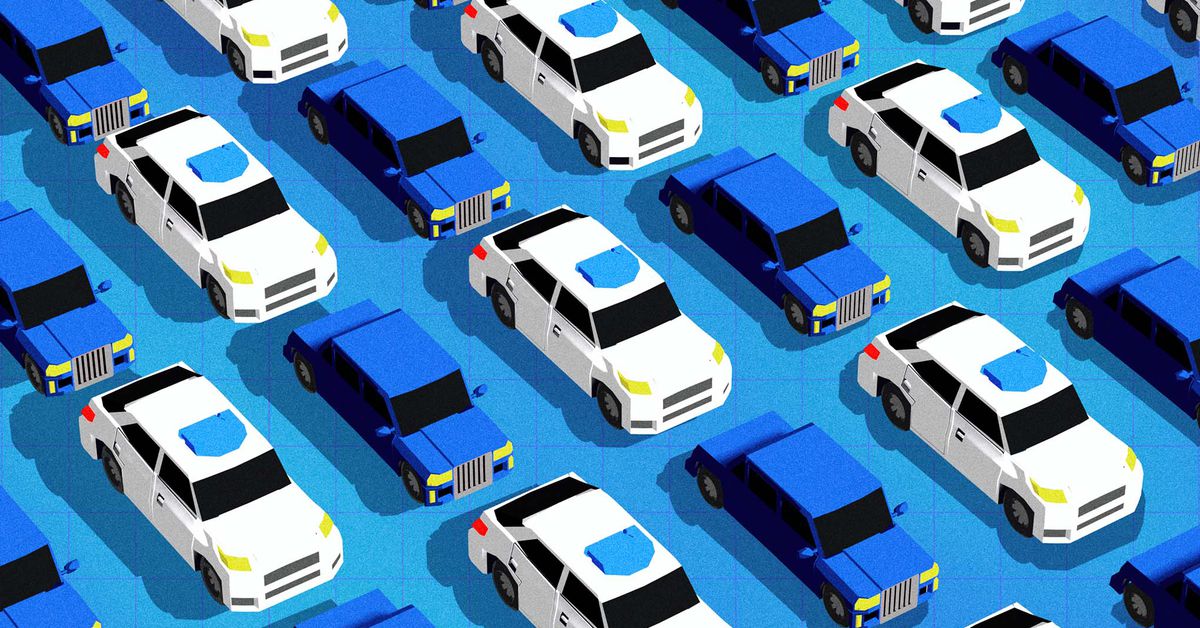alyaza [they/she]
internet gryphon. admin of Beehaw, mostly publicly interacting with people. nonbinary. they/she
- 218 Posts
- 190 Comments

 19·6 days ago
19·6 days agoIt’s been just a week since US telecom regulators announced a formal inquiry into broadband data caps, and the docket is filling up with comments from users who say they shouldn’t have to pay overage charges for using their Internet service. The docket has about 190 comments so far, nearly all from individual broadband customers.
Federal Communications Commission dockets are usually populated with filings from telecom companies, advocacy groups, and other organizations, but some attract comments from individual users of telecom services. The data cap docket probably won’t break any records given that the FCC has fielded many millions of comments on net neutrality, but it currently tops the agency’s list of most active proceedings based on the number of filings in the past 30 days.
The FCC will surely hear from many groups with different views on data caps, but Chairwoman Jessica Rosenworcel seems particularly keen on factoring consumer sentiment into the data-cap proceeding. When it announced the inquiry last week, Rosenworcel’s office published 600 consumer complaints about data caps that Internet users recently filed.
“During the last year, nearly 3,000 people have gotten so aggravated by data caps on their Internet service that they have reached out to the Federal Communications Commission to register their frustration,” Rosenworcel said last week. “We are listening. Today, we start an inquiry into the state of data caps. We want to shine a light on what they mean for Internet service for consumers across the country.”

 41·12 days ago
41·12 days agowho knew that removing the block feature and “Twitter’s new ToS says all disputes will be heard in U.S. District Court for the Northern District of Texas located in Tarrant County (Tesla investor Reed O’Connor’s court)” were not going to be winners among the remaining userbase
Agreed that he himself isn’t particularly relevant, but his supporters are still very influential in some areas of the open source community.
hilariously you can see some of the reflexive defense of him over in the FOSS thread of this article. way too many people feel obliged to run defense for this guy and it’s just cringeworthy to watch
he’s not particularly relevant at this point, but even this one note (and its retraction) feel like they should put to bed whether or not Richard Stallman should have any influence over anything:
Dutch pedophiles have formed a political party to campaign for legalization.
I am skeptical of the claim that voluntarily pedophilia harms children. The arguments that it causes harm seem to be based on cases which aren’t voluntary, which are then stretched by parents who are horrified by the idea that their little baby is maturing.
[Many years after posting this note, I had conversations with people who had been sexually abused as children and had suffered harmful effects. These conversations eventually convinced me that the practice is harmful and adults should not do it.]
like, bro, what are you doing. beyond being abhorrent, this is the sort of nonsense Reddit used to be infamous for and it made the website fucking rancid. why would anyone want to share a political movement with Stallman when he has to be debated out of positions like “you should not have sexual relations with people under the age of 13.”

 3·20 days ago
3·20 days agothe issue isn’t really with federating messages per se (that’s actually quite easy afaik, at least in federation terms), it’s with how to display them and everything associated with them. my understanding–based off of the fact that i’m working on a project where we’re having to fight how ActivityPub works, and how to display things is a big problem–is that ActivityPub is structured in a way you can be fast and loose with the stuff you’re federating, and it’s not a super big deal necessarily. but how it displays is a big deal, and that’s a total mess. and a lot of that mess begins with how Mastodon does stuff and the need to accommodate its choices (which i think are mostly bad for anything that isn’t microblogging, so non-microblog platforms have to design around it). it’s then amplified by differences in front-ends and clients, none of which can agree exactly on how to display or handle things, and some of which can’t/don’t display certain things at all and create differing user experiences as a result.
how Mastodon handles content warnings, for instance, is a big problem. functionally it’s just a
detailstag and i think in ActivityPub it’s literally just a “summary” field. but the field is–in addition to being used as adetailstag, a readmore, and a summary field–primarily used as the load bearing content warning functionality on Mastodon. so everything has to kind of assume the field will be used the way Mastodon uses it, which is… an issue, to say the least. obviously, not everything can handle that (or wants to handle that) the same way by design, so you get a bunch of differing ways to display the field that might not even contextually make sense for what’s in it.that’s what the issue is with translating from Mastodon-to-Lemmy and vice versa, and likewise would probably be the difficulty with translating stuff from forum-to-Lemmy even in a best-case scenario. i’m not even sure what the best way to handle our conversation would be, for example, since forums are often chronological/basically never indent replies/exchanges, but Reddit-alikes like Lemmy allow for different ways of sorting thread replies and do indent exchanges.

 14·20 days ago
14·20 days agointeroperability is the problem with this. what “integration with the fediverse” means practically for novel forms of software is “handling a trillion really annoying edge cases that Mastodon created for every other thing that isn’t Mastodon.” Lemmy, for example, handles interoperation with Mastodon incredibly poorly (and vice versa). you can do it, but for meaningful interaction it’s not very good. and forums have their own sets of edge cases that would probably make, say, forum-to-Lemmy interoperation a giant mess.

 4·20 days ago
4·20 days agoi mean my first layer of contention is that Substack is even a “journalism platform” for “independent creators” and not just a gentrified blogging platform like Medium, with a corresponding lack of vision in who it exists for and what it should be good at doing.
like, there are some actual journalists on there, yeah, but a lot of them are literally paid to use the platform/overlook the fact that it won’t do basic moderation like “banning fascists” (because the owners believe in the same technolibertarian nonsense as every other major platform). they wouldn’t be there at all without monetary incentives, which induce network effect and lock people into the infrastructure. and the scope creep is already real with Substack’s features, just like with whatever the hell Medium was doing 5-6 years ago. it’s trying to be an Everything App―even though nobody asked for that―and still the only things it does well are things that are basic functionality it can lift from elsewhere.

 18·20 days ago
18·20 days agowe clearly took a wrong turn somewhere because “less a journalism platform and more a payment system for creators” is nauseating on like 5 different levels

 5·1 month ago
5·1 month agothere is a comment on the article to this effect, for what that’s worth:
Angel
Hello Kris,
A lovely idea, but I won’t be visiting any public bathhouse any time soon. For many of us, the pandemic isn’t over. It’s contagious, airborne, and still killing and disabling people (including healthy people who have previously been infected and been ok) every day. Some ways to address the transmission of covid in bath houses can include rigorous HEPA filtration; required testing (using LAMP tests, for example, which are €10/test once you have the machine to read the results (another few hundred euro), and you can pool several people in one test); and maybe masks (I’ve read that they don’t work if they get wet, but I also read an article where someone tested several and went swimming with them. From memory, a regular Aura (~€1) worked nearly as long as an intentionally waterproof model). None of these are cheap by my standards. Not sure what you do about warts, foot fungus, and many other common bath house diseases.
Thanks, Angel

 2·1 month ago
2·1 month agobasically, put it this way: if a cop stops you and asks you for your phone–what are you realistically going to do in that situation the moment they don’t respect your “no” and begin to pressure you, threaten you, and decide to throw the legal book at you (however dubious) for saying no? for most people, the answer is going to be “just give up the phone and start complying with the cop” even though that is not something the cop should be able to do. because at the end of the day they have a gun, and can put you in jail (or at least make your day hellish) more-or-less unilaterally, with very little recourse for you unless you want to do expensive litigation.

 4·1 month ago
4·1 month agoBut if we’re talking about a law that actually says the cop cannot take your phone no matter what, and they do, then any public defender would be able to point it out and the judge would certainly have to enforce it. I can’t think of a way the cop would abuse their power because, in this case they don’t have it.
they can abuse their power because they’re a cop, with a badge and gun, and the right to maim or literally kill you with it (and probably get away with it even if it’s not strictly legal) if you don’t comply with their demands in the moment. again: cops consistently do not care about or follow legal procedures they’re supposed to, frequently fuck up those procedures even when they do, and most cops probably don’t even think of it as their job to secure some airtight case that stands up to legal scrutiny. it’s not a profession that lend itself to the kind of charitability that’s being given here, and the record of the profession makes it even less deserving of that charitability.

 26·1 month ago
26·1 month agoThe MyColorado FAQ explicitly states that an officer cannot take your phone, even if they think your digital ID is fraudulent. This whole article is a ton of fear mongering.
no offense but: even if you were to grant the notion that this is an exaggerated problem–cops are not well known for their rigorous adherence to the law or proper legal procedure. they routinely fuck up and violate civil liberties, up to and including murdering people for arbitrary reasons. and unless police are held accountable (which they almost never are for a variety of systemic reasons), what a state says they cannot do is effectively meaningless. it’s just words on a screen, really.

 33·1 month ago
33·1 month agoIn Riley v. California, the Supreme Court unanimously held that police need a warrant to search through cell phones, even during otherwise lawful arrests. But if you hand over your unlocked phone to a police officer and offer to show them something, “it becomes this complicated factual question about what consent you’ve granted for a search and what the limits of that are,” Brett Max Kaufman, a senior staff attorney in the ACLU’s Center for Democracy, told The Verge. “There have been cases where people give consent to do one thing, the cops then take the whole phone, copy the whole phone, find other evidence on the phone, and the legal question that comes up in court is: did that violate the scope of consent?”
If police do have a warrant to search your phone, numerous courts have said they can require you to provide biometric login access via your face or finger. (It’s still an unsettled legal question since other courts have ruled they can’t.) The Fifth Amendment typically protects giving up passcodes as a form of self-incrimination, but logging in with biometrics often isn’t considered protected “testimonial” evidence. In the words of one federal appeals court decision, it requires “no cognitive exertion, placing it firmly in the same category as a blood draw or fingerprint taken at booking.”
it’s unbelievable that there is a distinction in US caselaw between giving up your biometrics and giving up your password, and your essentially unchangeable biometrics are somehow the one you’re probably obliged to give to the cops if they ask. just an incredibly goofy system

 3·2 months ago
3·2 months agothree paragraphs saying you’re wrong and that the empirical evidence supports nothing you’re saying is not a “long-winded rant” lmao–this uncritical “trust me bro it’s actually fine, you just don’t get it” stuff is the exact reason i consider autonomous vehicle stuff to 98% worthless techbro hype and autofellatio. cite your sources if you want people to listen–i have, and you’ve refuted none of it!

 5·2 months ago
5·2 months agoThe whole point of induced demand in highways is that when you add capacity in the form of lanes it induces demand. So if our highways are already full and if that capacity isn’t coming from increased EV efficiency then where is it coming from? If there’s no increase in road capacity then what is inducing demand?
just for example: “freeing up both parking lot real estate, but more importantly, freeing up on street parking, creating more room for actual traffic to move”–every single one of these posited improvements would induce demand unless you literally demolish the infrastructure (which, if you’re just switching people one-to-one from regular cars to automated cars is not going to happen, because the number of cars will remain a constant). the existence of unused parking begets driving and is a predictor for more driving.[1] the existence of more space to move obviously begets more driving because the “highways” aren’t “full” anymore; and again, if it didn’t that would actually be worse because it incentivizes less safe driving practices.
You are describing how humans drive, not AVs. AVs always obey the speed limit and traffic calming signs.
if by AVs you mean “fully autonomous” ones that literally do not exist currently then sure–they better! but at that point nothing you say is meaningful, because the technology literally doesn’t exist. we might as well be talking about mass-adopted hydrogen cars or whatever.
but, if we mean semi-autonomous ones—the ones that clearly exist, and which companies advertise as autonomous, and which people actually use—no. absolutely not. these things routinely violate even the most obvious traffic laws and necessitate humans to intervene in their ordinary function. Waymo hits pedestrians even now, and it’s ostensibly one of the most advanced semi-autonomous programs in the world. Uber literally killed a pedestrian and got into legal trouble over it. Tesla’s problems are omnipresent to the point where the NHTSA has said their feature is unsafe in practice and people make it a punchline. you can’t no-true-Scotsman this technology. even in the best and least ambiguous traffic circumstances it has obvious problems!
↩︎In 2015, a group of researchers led by Chris McCahill looked at historical trends in parking supply and commuter behavior for nine cities: Albany, New York; Berkeley, California; the Washington, DC, suburbs of Arlington, Virginia, and Silver Spring, Maryland; Cambridge, Lowell, and Somerville, Massachusetts; and Hartford and New Haven, Connecticut. Using historical aerial photography from three dates to identify and approximate the parking supply, McCahill found that parking growth between 1960 and 1980 was a “powerful predictor” of car use in the following two decades. Every ten spaces added per one hundred residents before 1980 were linked to an 8 percent increase in the share of residents driving to work after 1980. Increase in the parking supply in the study’s first two decades was directly correlated with increases in car use in the following two decades. More parking appeared to cause more driving, not the other way around.

 6·2 months ago
6·2 months agoYes, I have no doubt there would be induced demand, but that extra demand wouldn’t be at the cost of anything.
But if AVs add more capacity to our roads, that will be entirely because they are driving more efficiently.
you are literally doing what i mean when i say you are making assumptions with no evidence. there is, again, no reason to believe that “driving more efficiently” will result from mass-adoption of automated vehicles–and even granting they do, your assumption that this wouldn’t be gobbled up by induced demand is intuitively disprovable. even the argumentation here parallels other cases where induced demand happens! “build[ing] new roads or widen[ing] existing ones” is a measure that is almost always justified by an underlying belief that we need to improve efficiency and productivity in existing traffic flows,[1] and obviously traffic flow does not improve in such cases.
but granting that you’re correct on all of that somehow: more efficiency (and less congestion) would be worse than inducing demand. “efficiency” in the case of traffic means more traffic flow at faster speeds, which is less safe for everyone—not more.[2] in general: people drive faster, more recklessly, and less attentively when you give them more space to work with (especially on open roadways with no calming measures like freeways, which are the sorts of roads autonomous vehicles seem to do best on). there is no reason to believe they would do this better in an autonomous vehicle, which if anything incentivizes many of those behaviors by giving people a false sense of security (in part because of advertising and overhyping to that end!).
You’re asking for something that does not exist. How am I supposed to provide you evidence proving what the results of mass adoption of AVs will be when there has never been a mass adoption of AVs.
you asserted these as “other secondary effects to AVs”–i’m not sure why you would do that and then be surprised when people challenge your assertion. but i’m glad we agree: these don’t exist, and they’re not benefits of mass adoption nor would they likely occur in a mass adoption scenario.
For instance, what is your reasoning for believing that AVs could never be fundamentally safer than human drivers who are frequently tired, angry, distracted, impaired, impatient, etc?
the vast majority of road safety is a product of engineering and not a product of human driving ability, what car you drive or its capabilities, or other variables of that nature. almost all of the problems with, for example, American roadways are design problems that incentivize unsafe behaviors in the first place (and as a result inform everything from the ubiquity of speeding to downstream consumer preferences in cars). to put it bluntly: you cannot and will not fix road safety through automated vehicles, doubly so with your specific touted advantages in this conversation. the road designs that create bad driving behavior don’t cease to be an issue because people switch to an automated vehicle.
take for instance “Tackling Traffic Congestion,” Transportation Quarterly 40, no. 2 (1986), which states “growing congestion [in the Bay Area] […] is the result of development that comes with an improving economy compounded by a lagging expansion of freeway and transit capacity.” ↩︎
see for instance Leonard Evans, “Future Predictions and Traffic Safety Research,” Transportation Quarterly 47, no. 1 (1993): “although congestion impedes mobility, it increases safety, as measured by serious injuries and fatalities.” and Arnold Vey, “Relationship between Daily Traffic and Accident Rates,” American City 52, no. 9 (1937), who observed that beyond a certain point congestion reduced accident rates. congestion unsurprisingly acts as a calming measure when it becomes severe enough. ↩︎

 8·2 months ago
8·2 months agoAs long as cars exist, AVs will be better than human drivers,
this is at obvious odds with the current state of self-driving technology itself–which is (as i noted in the other comment) subject to routine overhyping and also has rather minimal oversight and regulation generally. Tesla is only the most egregious example in both respects; even stuff like Waymo is pretty much entirely reliant on taking their word for it that the technology would be safer than humans (which meshes awkwardly with well publicized problems and efforts to hide robotaxi safety records).

 6·2 months ago
6·2 months agoSecondly, it’s based on the idea that people even can drive more than they already do.
they can. induced demand is omnipresent in basically all vehicular infrastructure and vehicular improvements and there’s no reason to think this would differ with autonomous vehicles
Fourthly, it ignores other secondary effects to AVs, like suddenly not needing nearly as much parking, freeing up both parking lot real estate, but more importantly, freeing up on street parking, creating more room for actual traffic to move, and their increased patience not causing constant traffic jams because they tailgated someone and then slammed on the brakes.
okay but: literally none of this follows from mass-adoption of autonomous vehicles. this is a logical leap you are making with no supporting evidence—there is, and i cannot stress this enough, no evidence that if mass-adoption occurs any of this will follow—and in general the technology is subject to far more fabulism and exaggeration (like this!) than legitimate technological advancement or improvement of society.

 11·2 months ago
11·2 months agoi’m honestly not sure Trump knows anything about the FTC, and if his campaign was smart these are the kinds of things they’d propose instead of “IVF should be illegal but also you’re a degenerate for not having children”





















they realized that they could just become an SEO farm/content mill and churn out absurd numbers of articles while paying people table scraps or nothing at all, and they’ve never changed